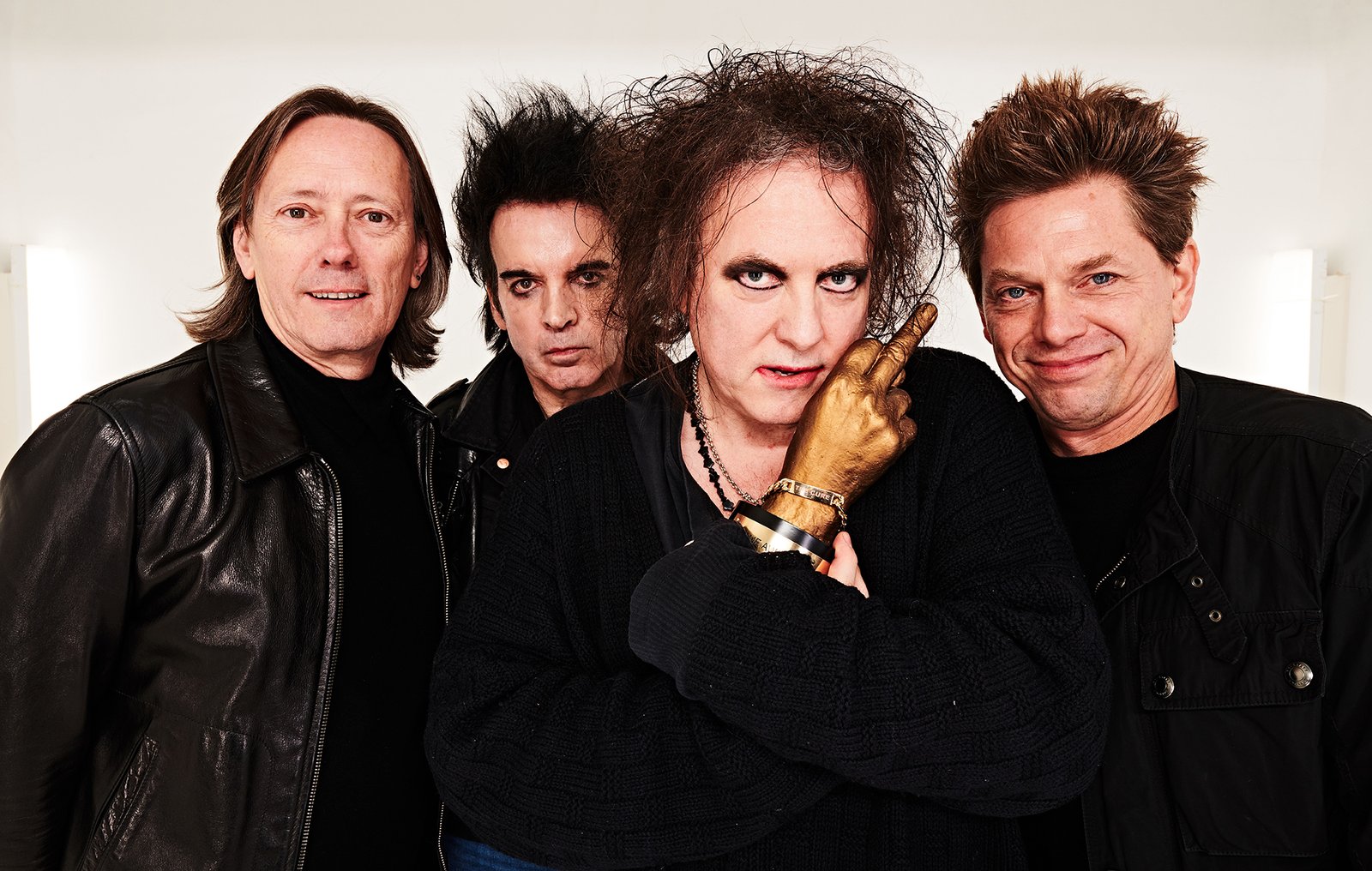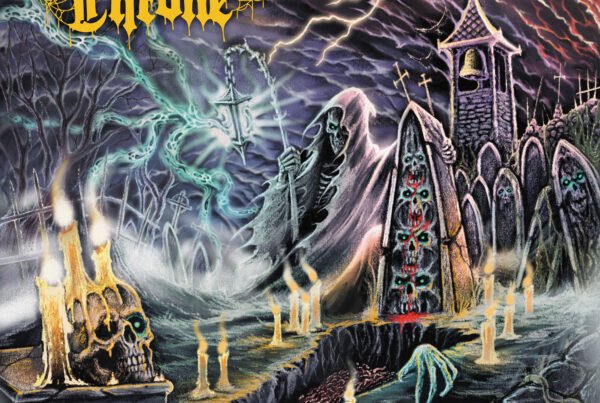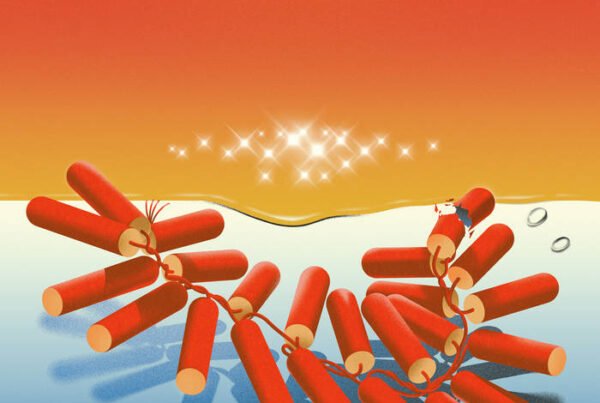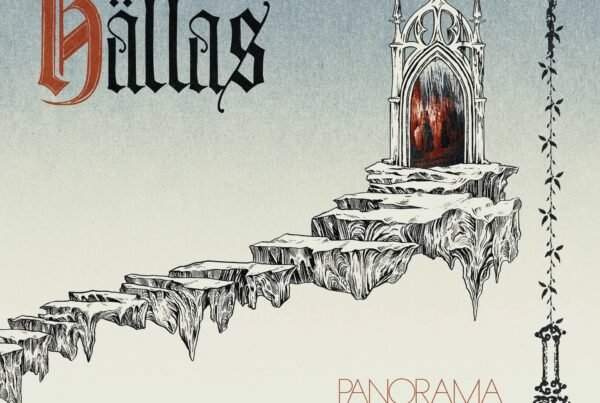The Cure lean into the existential despair of old age on the somber and morose Songs of a Lost World.
Release date: November 1, 2024 | Polydor Records | Instagram | Facebook | X
I chose to write this review not so much to celebrate The Cure‘s new album Songs of a Lost World– even though it does deserve celebrating- but to honor a legacy that goes way beyond the fourteen studio albums and almost five decades of music the band has made. For many of us, there aren’t too many bands that have lasted that long, much less a band that played such an integral role in shaping how we’ve traveled through this mortal coil. It’s not so much that The Cure have acted as a soundtrack to my life, and many others, over the years, but that they’ve been there as if they were a physical presence. They exist because we, as humans, exist and this connection is a visceral, live one. Much is made of their somber, depressive lyrics and this, of course, is the driving force behind defining the typical sad boi existence of their fans; however, the band is way more than that. Simultaneously dark and celebratory, the band’s best work is explosive and massive in nature- much of this captured beautifully on Songs of a Lost World- but above all, it can be absolutely joyous in a way that no other band has come close to conveying.
While my own relationship with The Cure begins way before 1999, it wasn’t truly solidified until I joined the Peace Corps that year as a volunteer in the West African country of Cameroon. The volunteers pitched in to rent a provincial house in the coastal town of Limbe, about a twelve-hour bush taxi ride from my posting near the Nigerian border. The provincial house existed because our bank was there, and any time I got paid or needed money I’d have to make the long, arduous journey from my sweaty, dusty volunteer town down an apocalyptic mud road to Limbe. The house was up a hill that overlooked the city. In the distance, through the ever-permanent clouds, rose Mount Cameroon. After a long, sweaty ride from my village, eight human beings piled deep into the small confines of a Nissan Sentra, arriving at the house felt like a massive release, where I could finally get back the feeling in my legs and wash the dust off with a cold shower.
The house had two CDs and a cheap boom box. One of the CDs was Catherine Wheel’s Ferment. The other was The Cure’s Disintegration. Fresh from the shower, a cold Mutzig in hand, I’d put the latter CD in the player and go stand out on the porch with the evening sun setting over the Atlantic Ocean and the jungle enclosing the city. I’d watch the fruit bats fly in and out of the shadows, as the bombastic chords of “Plainsong” echoed out over the horizon. In terms of music connecting with a sense of place, I still haven’t encountered such a perfect pairing. Everytime I hear that album, particularly those opening notes, all of those feelings I had standing on that back porch come flooding back.
Many people on this planet have similar stories about The Cure. They’ve become such a part of the internal and external fabric of so many human beings that the band transcends just being a band. They are more than that. They are a soundtrack in the sense that you can’t extricate the sound from the time or the place. If you tried, the whole thing would come unraveled. And The Cure have always been about that: tying together the loose ends of those of us who have felt as if everything was coming undone.
While the band had always been ever-present in my life, it wasn’t until I met my wife shortly before joining the Peace Corps that I listened to them with any real fidelity. My wife was one of those kids: deeply empathic and hyper-aware, with an intuitiveness that led to bouts of self-doubt. She wore black and had Doc Martens. Her asymmetrical haircut hid a face that belied the anxiety and depression that plagued so many kids in the ‘80s and early ‘90s. It was The Cure that got her through those dark days, that made the sting of insults from the popular kids hurt just a little bit less.
But it wasn’t just kindred souls that people like my wife saw in the band. The Cure were always about celebration as well. Even if death was a welcome respite from life at its most dreary, life was something to be thankful for, and the music of The Cure reveled in this majesty. Their long, repetitive intros, sometimes running for two to three minutes before Robert Smith did his Robert Smith thing, gave the listener a place to ruminate and rest. It was a musical bed in every sense of the word, a place to find solace and peace. The Cure was a chance to reset and wake up the next day, ready to move forward, even if in the face of pain and misery.
In terms of pain and misery, Songs of a Lost World finds the band at their most gloriously miserable. At 65 years old, Robert Smith’s songs of loss and heartbreak seem even more earnest now. This isn’t metaphorical death, after all: it’s very much one encountered more and more often as we all approach the downward slope of time. The musical beds laid down by the band in 2024 are more akin to the silk-lined cushions of a coffin than the mattress-on-the-floor mentality of our early twenties, but they are still a source of comfort. Opener “Alone” begins with a morose, melancholy intro that takes its own bitter-sweet time before Smith comes in with the vocals. Well after three minutes, Smith sings ‘this is the end of every song we sing’ and immediately the listener is beset with moods that have been decades in the making. The band continues this exploration of loss, a repeated mantra of how the things we hold dear all have used-by dates, throughout the album. It’s as if all the songs The Cure have written over the past four decades have ultimately led to this point.
Songs of a Lost World most closely aligns, in terms of its pacing and musicality, with 1989’s Disintegration and 1992’s Wish, the two albums that represent the band at its majestic peak. If the band’s early work was drenched in the darkness of the ’80s goth that they defined and the post-punk energy that infused the British musical landscape, those two albums show the band moving from three minute pseudo-pop masterpieces to absolute epic explorations of torment and emotional discomfort. “And Nothing is Forever” could have been lifted from the second side of Disintegration, a haunting melody on the piano, accentuated by strings, ushering in the inevitable desolation of a life riddled with loss. Reeves Gabrels’ guitar work adds new textures, as subtle as they are, to the band’s signature sound, and while the guitar player has been in the band for well over a decade now, it still feels as if his addition has infused the band with a new life, even if it is as miserable as the old one.
In contrast, bassist Simon Gallup has always been an integral part of the band, his guitar slung low as the chorus-drenched melodies moved Smith’s compositions forward, and his sound on Songs of a Lost World still acts to lay a foundational anchor to the soaring instrumentation. If the first two songs on the album find Gallup uncharacteristically taking a backseat, “A Fragile Thing” showcases his work at its best. The album does a great job of conjuring up feelings of familiarity without evoking the maudlin nostalgia associated with other ‘legacy’ acts. In fact, Songs of a Lost World brings into question what being a ‘legacy’ act entails. Is it the fact that the best days of the band are behind them? With other such acts, it seems it’s either an outright celebration of bygone days or a refusal to acknowledge the passage of time. In either case, The Cure have defiantly and emphatically circumvented these pratfalls. Only a band as steeped in the gothic misery of living could come out with an album that seems so entirely connected to its time: Songs of a Lost World is a record for this moment, for this time, for these fans. It’s a record that acknowledges the nearness of death, and it confronts the grimmest of reapers head on.
“Drone:Nodrone” marks the mid-point of the album and a highpoint. It has the surging confidence of some of the best songs from Disintegration, like the title track itself or “Fascination Street”. Gallup’s over-driven bass, Jason Cooper’s drums, and the keyboard and synth embellishments that Smith has used to dress the song up, along with psychedelic passages of wah-wah drenched guitar, make the song sound like the moment at which we drag ourselves out of the bed to head out into the world. “Drone:Nodrone”, if not lyrically, is about celebrating the ability to get up when the weight of grief seems as if it’s so great one cannot possibly move. Alternatingly dark and celebratory, the song propels Songs of a Lost World to its sad, inevitable conclusion.
And what a conclusion it is. “I Can Never Say Goodbye”, with its ‘something wicked this way comes’ refrain, connects the grief of losing a loved one to the classic Ray Bradbury novel of the same name, a story of how our self-centeredness is at the source of all of our misplaced malice and sorrow. Lest we get consumed with what we’ve lost, Smith seems to communicate through the song, let us not forget what we once had. This isn’t to say the songs on Songs of a Lost World exist in a spectrum that has hope somewhere near its slowly beating heart; Smith has been doing this way too long to acknowledge there’s any kind of hope buried in this painful existence. That after all isn’t what The Cure has set out to do, now or ever. They’ve simply served as an expression for all of us at our emotional nadirs, and this gives us enough initiative to push through to The End.
As for that End? Ten-minute “Endsong” closes the album- a stunning, audacious epilogue to a career that in some ways defies expectations. Like the first and last songs on Wish, “Alone” and “Endsong” serve as bookends to an album that peels back layers of suffering. On “Alone” Smith sings that ‘this is the end of every song we sing.’ On “Endsong”, the band closes this loop with Smith singing ‘left alone with nothing at the end of every song’. And while The Cure may feel that they’ve left it all out there on the album, every inch of their miserable, black-clad selves wasted and spent over the course of forty-five minutes, for old heads like myself and millions of others we’ve never felt alone at the end of one of their compositions. If we are going to be wallowing in our own individual despondencies, at least we can all go down together.
Songs of a Lost World isn’t an attempt to garner the band new fans. The songs linger on the dark edges of existence, and there’s no “Just Like Heaven” or “Why Can’t I Be You” that could lure in the casual fans that caused the band to blow up in the late ’80s. Even the production, at times, can be harsh and unforgiving. But Robert Smith and company have all the fans they’ll ever need, and they’re okay with that. If you’ve spent the past four decades with the band, like I and millions of others have, then Songs of a Lost World will fit like an old weathered black trench coat and a pair of beat up Doc Martens. Life is filled to the brim with dolor and melancholia, but the spaces in-between can be as glorious and life-affirming as the music these old men from West Sussex (at least some of them) have been making for the last four decades. The Cure may be closing in on the end of an illustrious career, but going quietly into this dark night is not the way they’ve chosen to go.






